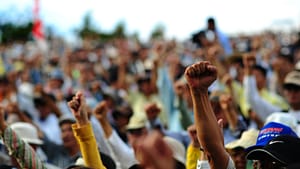Making a fuss at the opera
Anti-Putin protests at the Metropolitan Opera: a response

Bringing one’s political grievances into concert halls and the opera house seems to be a popular sport these days. Steve Cohen, in his essay about the disturbances at the Met during the recent production of Tchaikovsky’s Iolanta, suggests that if prominent performers — in this case, conductor Valery Gergiev and soprano Anna Netrebko — choose to articulate their political opinions in public, it is fair play for others to protest those opinions in the artists’ workplace. But doing so isn’t tit for tat; it’s an abuse of the privilege of a ticket, and the right of others to what their own has bought them.
Gergiev and Netrebko have voiced their support for Russia’s actions — defensive, say some; aggressive, say others — in the ongoing conflict in Ukraine. This is certainly their right. It’s also the right of those who disagree with them to say so, but not when others are involved whose activities, livelihoods, and reasonable expectations are involved: not only the hundreds of people involved in producing an opera, but the thousands who come to listen to it.
There are causes I feel strongly about, too, and I have committed acts of civil disobedience in my time. But I wouldn’t cause a ruckus in a church — even though Jesus once did — because I think there are some occasions that ought to be off limits to the First Amendment (cheering or booing the specific matter at hand excepted, of course). If a church, synagogue, or mosque service were devoted to, say, a plea for peace in Ukraine, comments would obviously be appropriate, and I might have my own to make. But the civility that makes public life possible at all requires a respect for the occasion for which people have gathered. An opera house is not Hyde Park.
Steve Cohen also points to Gergiev’s refusal to endorse the rights of Russian homosexuals, which he finds all the more ironic in that Tchaikovsky is widely reputed to have been a closeted gay. I get that point even less. Does one have to endorse gay rights to conduct a gay composer? If an artist must meet any and everybody’s idea of political correctness before he can perform, we might be waiting a long time for the show to begin. Tchaikovsky himself, in his Carnegie Hall debut, conducted among other things the imperial march he had composed for the coronation of the reactionary Alexander III. Should Russian exiles have had the right, not to say the duty, to boo him off the stage?
A cultural performance — musical, theatrical, whatever — is also a public expression; that is, an act of cooperative free speech. If you willfully disrupt it, in a hall you have not rented, to impose your own views on a captive audience that hasn’t come to hear you, your free speech is actually negating the freedom of everyone else present. You may think that Vladimir Putin is the devil incarnate, or that Iolanta is grossly unfair in its depiction of blind princesses. Take it outside, if you must. Picket if you like, and more power to you. But let’s put a lid on cultural terrorism. It’s been getting a little out of hand.
For Robert Zaller’s review of a recent concert in which Gergiev conducted the Philadelphia Orchestra, click here.
Sign up for our newsletter
All of the week's new articles, all in one place. Sign up for the free weekly BSR newsletters, and don't miss a conversation.

 Robert Zaller
Robert Zaller